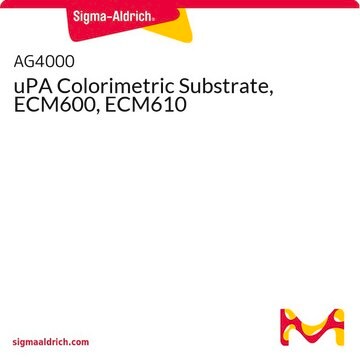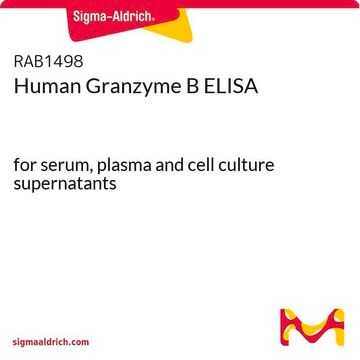ECM600
uPA Activity Assay Kit
The uPA Activity Assay Kit provides a quick, efficient & sensitive system for evaluation of uPA activity & for screening of uPA inhibitors.
Se connecterpour consulter vos tarifs contractuels et ceux de votre entreprise/organisme
About This Item
Code UNSPSC :
12161503
eCl@ss :
32161000
Nomenclature NACRES :
NA.84
Produits recommandés
Niveau de qualité
Activité spécifique
100000 units/mg protein
Espèces réactives
human
Conditionnement
pkg of ~10 μg standard
Fabricant/nom de marque
Chemicon®
Technique(s)
activity assay: suitable
Numéro d'accès NCBI
Numéro d'accès UniProt
Méthode de détection
colorimetric
Conditions d'expédition
dry ice
Informations sur le gène
human ... PLAU(5328)
Description générale
Urokinase-type Plasminogen Activator (uPA) is a 52 kDa serine protease which has been implicated in a number of physiological and pathological processes, including tissue remodeling1, angiogenesis2, fibrinolysis and tumor spread. When bound to its cell surface receptor, uPA is converted from the single chain pro-form uPA to the active 2-chain HMW-uPA. uPA has been shown to play a role in basement membrane degradation, via a cascade involving activation of plasminogen and the matrix metalloproteinases3. Inhibitors of uPA have been shown to slow primary tumor growth and metastasis4-7.
The CHEMICON uPA Activity Assay Kit provides a quick, efficient and sensitive system for evaluation of uPA activity and for screening of uPA inhibitors. The assay is colorimetric and does not require radioactivity or fluorescence equipment. The assay is sensitive over a range of 0.05-50 units of uPA activity.
Test Principle:
The CHEMICON uPA Activity Assay Kit utilizes a chromogenic substrate, which is cleaved by active uPA. Addition of this substrate to a uPA-containing sample results in a colored product, detectable by its Optical Density at 405nm (OD405).
Application:
The CHEMICON uPA Assay Kit is ideal for measurement of uPA activity in purified preparations and cell culture, as well as in serum where pathological conditions such as sepsis exist. The assay is also useful for screening inhibitors of the enzymatic activity of uPA.
Each CHEMICON uPA Activity Assay Kit contains sufficient reagents for the evaluation of 96 samples, including uPA from human urine as a positive control. Duplicate or triplicate samples are suggested.
The CHEMICON uPA Activity Assay Kit is intended for research use only; not for diagnostic or therapeutic applications.
The CHEMICON uPA Activity Assay Kit provides a quick, efficient and sensitive system for evaluation of uPA activity and for screening of uPA inhibitors. The assay is colorimetric and does not require radioactivity or fluorescence equipment. The assay is sensitive over a range of 0.05-50 units of uPA activity.
Test Principle:
The CHEMICON uPA Activity Assay Kit utilizes a chromogenic substrate, which is cleaved by active uPA. Addition of this substrate to a uPA-containing sample results in a colored product, detectable by its Optical Density at 405nm (OD405).
Application:
The CHEMICON uPA Assay Kit is ideal for measurement of uPA activity in purified preparations and cell culture, as well as in serum where pathological conditions such as sepsis exist. The assay is also useful for screening inhibitors of the enzymatic activity of uPA.
Each CHEMICON uPA Activity Assay Kit contains sufficient reagents for the evaluation of 96 samples, including uPA from human urine as a positive control. Duplicate or triplicate samples are suggested.
The CHEMICON uPA Activity Assay Kit is intended for research use only; not for diagnostic or therapeutic applications.
Application
Notes on uPA activity assay sample preparation.
Plasma: Perform venepuncture of the cubial vein, with minimal stasis after a rest period of at least 10min. Discard the first few milliliters of blood. Collect nine volumes of blood in one volume of cold sodium citrate, 0.11 mol/L, in a polycarbonate tube, mix gently and place on ice. Subsequently, prepare platelet-poor plasma by centrifugation in a refrigerated centrifuge (30 min, 2000g). Snap-freeze plasma samples of 0.3 mL to 0.6 mL and store at -60°C. Before use, thaw plasma rapidly in a water bath at 37°C and put on ice.
Tissue: There are numerous publications for the extraction of uPA from tissues. A suitable buffer for extraction of uPA from the membrane fraction requires Triton X100. A non-detergent extract (also called cytosolic fraction) does not require Triton, however the membrane fraction is removed by ultracentrifugation, so uPA activity associated with the membrane fraction is bypassed by measuring only the cytosols. See Peer-Reviewed Papers for some references that describe extraction procedures for uPA.
Cell culture: Isolate cell culture supernatant and use directly.
Plasma: Perform venepuncture of the cubial vein, with minimal stasis after a rest period of at least 10min. Discard the first few milliliters of blood. Collect nine volumes of blood in one volume of cold sodium citrate, 0.11 mol/L, in a polycarbonate tube, mix gently and place on ice. Subsequently, prepare platelet-poor plasma by centrifugation in a refrigerated centrifuge (30 min, 2000g). Snap-freeze plasma samples of 0.3 mL to 0.6 mL and store at -60°C. Before use, thaw plasma rapidly in a water bath at 37°C and put on ice.
Tissue: There are numerous publications for the extraction of uPA from tissues. A suitable buffer for extraction of uPA from the membrane fraction requires Triton X100. A non-detergent extract (also called cytosolic fraction) does not require Triton, however the membrane fraction is removed by ultracentrifugation, so uPA activity associated with the membrane fraction is bypassed by measuring only the cytosols. See Peer-Reviewed Papers for some references that describe extraction procedures for uPA.
Cell culture: Isolate cell culture supernatant and use directly.
Research Category
Cell Structure
Cell Structure
Composants
uPA Positive Control: (Part No. 90058) One lyophilized vial, 1000 units, of uPA from human urine.
Chromogenic Substrate: (Part No. 90057) One 5 mg bottle of Tripeptide with pNA group.
Assay Buffer, 10X: (Part No. 90091) One 5 mL bottle.
Chromogenic Substrate: (Part No. 90057) One 5 mg bottle of Tripeptide with pNA group.
Assay Buffer, 10X: (Part No. 90091) One 5 mL bottle.
Définition de l'unité
Sensitivity: One unit is defined as the amount of enzyme equal to an international standard tested by the fibrinolytic method of Johnson, et al. {Johnson, A.J., et al. 1969. Thromb. Diath. Haemorrh. 21, 259.}
Stockage et stabilité
Store kit materials at -20°C for up to 6 months. After reconstitution, store uPA positive control at -70°C and substrate at 2 - 8°C.
Informations légales
CHEMICON is a registered trademark of Merck KGaA, Darmstadt, Germany
Clause de non-responsabilité
Unless otherwise stated in our catalog or other company documentation accompanying the product(s), our products are intended for research use only and are not to be used for any other purpose, which includes but is not limited to, unauthorized commercial uses, in vitro diagnostic uses, ex vivo or in vivo therapeutic uses or any type of consumption or application to humans or animals.
Mention d'avertissement
Danger
Mentions de danger
Conseils de prudence
Classification des risques
Resp. Sens. 1
Code de la classe de stockage
10 - Combustible liquids
Certificats d'analyse (COA)
Recherchez un Certificats d'analyse (COA) en saisissant le numéro de lot du produit. Les numéros de lot figurent sur l'étiquette du produit après les mots "Lot" ou "Batch".
Déjà en possession de ce produit ?
Retrouvez la documentation relative aux produits que vous avez récemment achetés dans la Bibliothèque de documents.
Youcheng Ding et al.
Oncology letters, 11(6), 4208-4216 (2016-06-18)
Peritoneal metastasis is a primary cause of mortality in patients with gastric cancer. Urokinase-type plasminogen activator (uPA) has been demonstrated to be associated with tumor cell metastasis through the degradation of the extracellular matrix. The present study aimed to investigate
Cloning and expression of a novel murine anti-human Fas antibody.
H Yoshida-Kato,K Ichikawa,J Yamaguchi,K Watanabe,J Ohsumi,S Yonehara,N Serizawa
Bioscience, Biotechnology, and Biochemistry null
Dopamine D1 receptor modulates hippocampal representation plasticity to spatial novelty.
Anh Hai Tran,Teruko Uwano,Tatsuo Kimura,Etsuro Hori,Motoya Katsuki,Hisao Nishijo,Taketoshi Ono
The Journal of Neuroscience null
Molecular analysis of PIP2 regulation of HERG and IKr.
Jin-Song Bian,Anna Kagan,Thomas V McDonald
American Journal of Physiology. Heart and Circulatory Physiology null
P A de Bruin et al.
Cancer research, 47(17), 4654-4657 (1987-09-01)
Malignant changes are often accompanied by alterations in activity and composition of the plasminogen activators (PA). To study the relationship between PA expression and the development of colorectal cancer, we determined urokinase-type plasminogen activator (u-PA) and tissue-type plasminogen activator (t-PA)
Notre équipe de scientifiques dispose d'une expérience dans tous les secteurs de la recherche, notamment en sciences de la vie, science des matériaux, synthèse chimique, chromatographie, analyse et dans de nombreux autres domaines..
Contacter notre Service technique







